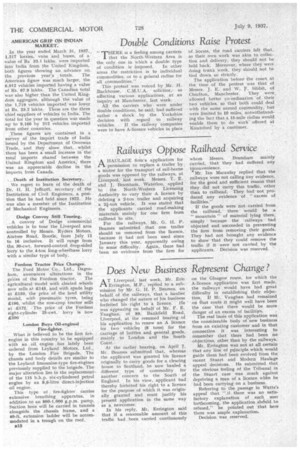Does New Business Represent Change?
Page 28

If you've noticed an error in this article please click here to report it so we can fix it.
AT Liverpool, last week, Mr. Eric Errington, M.P., replied to a submission by Mr. G. H. P. Bearnes, on behalf of the railways, that a haulier who changed the nature of his business
forfeited his right to '"a licence. He was appearing on behalf of Mr. F. E. Vaughan, of 89, Bankfield Road, Liverpool, at the resumed hearing of his appliCation _to renew an A licence for two vehicles (8 tons) for the carriage of bottles and general goods, mainly to London and the South Coast.
At the earlier hearing, on April 7, Mr. Beanies submitted that, whereas the applicant was granted his licence originally to carry goods for a clearing house to Scotland, he now hauled a different type of commodity for another concern to the South of England. In his view, applicant had thereby forfeited his right to a licence for the purpose of which it was originally granted and must justify his present application in the same way as a newcomer.
In his reply, Mr, Erzington said that if a reasonable amount of this traffic had been carried continuously on the Glasgow route, for which the A-licence application was first made, the railways would have had great difficulty in establishing their objection. If M:. Vaughan had remained on Let route it might well have been' the case that there would be more danger of an excess of facilities,
The real basis of this .application was the considerable body orneW business from an existing customer and in that connection . it . was interesting to remember that— there had been no objections, other than by the railways; Mr. Errington was not at all certain that any line of principle. which would guide them had been evolved from the. recent Stuart. and, Modern Haulage appeal decisions. He .submitted that the obvious feeling of the Tribunal in the Stuart case was much . against depriving a man of a licen.ce whbn he had been carrying on a business.
Referring to the passage in, Watts's appeal that. ".if there was no satisfactory. explanation of such user forthcoming, the application shduld. be refused," he pointed out that here there was ample explanation.
Decision was reserved.




















































































